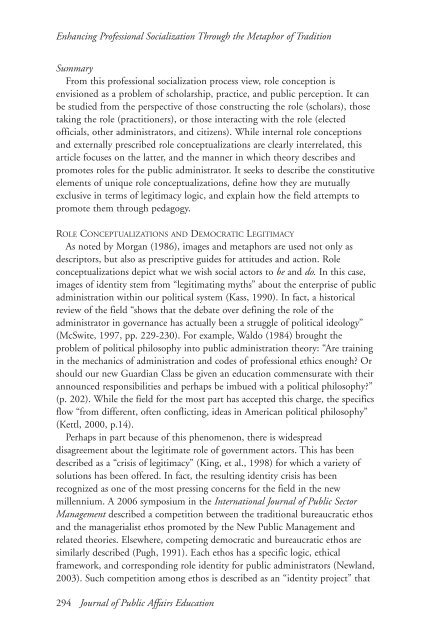journal of public affairs education - NASPAA *The Global Standard ...
journal of public affairs education - NASPAA *The Global Standard ...
journal of public affairs education - NASPAA *The Global Standard ...
- No tags were found...
Create successful ePaper yourself
Turn your PDF publications into a flip-book with our unique Google optimized e-Paper software.
Enhancing Pr<strong>of</strong>essional Socialization Through the Metaphor <strong>of</strong> TraditionSummaryFrom this pr<strong>of</strong>essional socialization process view, role conception isenvisioned as a problem <strong>of</strong> scholarship, practice, and <strong>public</strong> perception. It canbe studied from the perspective <strong>of</strong> those constructing the role (scholars), thosetaking the role (practitioners), or those interacting with the role (elected<strong>of</strong>ficials, other administrators, and citizens). While internal role conceptionsand externally prescribed role conceptualizations are clearly interrelated, thisarticle focuses on the latter, and the manner in which theory describes andpromotes roles for the <strong>public</strong> administrator. It seeks to describe the constitutiveelements <strong>of</strong> unique role conceptualizations, define how they are mutuallyexclusive in terms <strong>of</strong> legitimacy logic, and explain how the field attempts topromote them through pedagogy.ROLE CONCEPTUALIZATIONS AND DEMOCRATIC LEGITIMACYAs noted by Morgan (1986), images and metaphors are used not only asdescriptors, but also as prescriptive guides for attitudes and action. Roleconceptualizations depict what we wish social actors to be and do. In this case,images <strong>of</strong> identity stem from “legitimating myths” about the enterprise <strong>of</strong> <strong>public</strong>administration within our political system (Kass, 1990). In fact, a historicalreview <strong>of</strong> the field “shows that the debate over defining the role <strong>of</strong> theadministrator in governance has actually been a struggle <strong>of</strong> political ideology”(McSwite, 1997, pp. 229-230). For example, Waldo (1984) brought theproblem <strong>of</strong> political philosophy into <strong>public</strong> administration theory: “Are trainingin the mechanics <strong>of</strong> administration and codes <strong>of</strong> pr<strong>of</strong>essional ethics enough? Orshould our new Guardian Class be given an <strong>education</strong> commensurate with theirannounced responsibilities and perhaps be imbued with a political philosophy?”(p. 202). While the field for the most part has accepted this charge, the specificsflow “from different, <strong>of</strong>ten conflicting, ideas in American political philosophy”(Kettl, 2000, p.14).Perhaps in part because <strong>of</strong> this phenomenon, there is widespreaddisagreement about the legitimate role <strong>of</strong> government actors. This has beendescribed as a “crisis <strong>of</strong> legitimacy” (King, et al., 1998) for which a variety <strong>of</strong>solutions has been <strong>of</strong>fered. In fact, the resulting identity crisis has beenrecognized as one <strong>of</strong> the most pressing concerns for the field in the newmillennium. A 2006 symposium in the International Journal <strong>of</strong> Public SectorManagement described a competition between the traditional bureaucratic ethosand the managerialist ethos promoted by the New Public Management andrelated theories. Elsewhere, competing democratic and bureaucratic ethos aresimilarly described (Pugh, 1991). Each ethos has a specific logic, ethicalframework, and corresponding role identity for <strong>public</strong> administrators (Newland,2003). Such competition among ethos is described as an “identity project” that294 Journal <strong>of</strong> Public Affairs Education
















